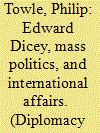| Srl | Item |
| 1 |
ID:
129678


|
|
|
|
|
| Publication |
2014.
|
| Summary/Abstract |
The journalist, Edward Dicey, made an original contribution to the mid-nineteenth century debate on the growing involvement of the mass of people in political affairs. He argued that political education initially encouraged nationalism, causing the series of wars on which he reported. Beginning as an enthusiast for Camillo Cavour, the Piedmontese statesman, and the unification of Italy, Dicey became increasingly aware of the destructive impact of Irish nationalism on Britain and the threat to the British Empire from the growth of nationalist feelings amongst colonial peoples. However, he forecast that in the end, the forces of what at present is known as globalisation would bring nations closer together. Dicey is not well remembered today, but his work is important for showing the way in which a well-travelled Briton reacted to the breakdown in European security in the mid-nineteenth century and the growth of extra-European nationalism.
|
|
|
|
|
|
|
|
|
|
|
|
|
|
|
|
| 2 |
ID:
089205


|
|
|
|
|
| Publication |
2009.
|
| Summary/Abstract |
The unification of Italy between 1859 and 1861 was a great victory for European nationalism. To many contempraries, the formation of an Italian nation-state seemed proof that the future of Europe lay with nations, while the largely unexpected.
|
|
|
|
|
|
|
|
|
|
|
|
|
|
|
|
| 3 |
ID:
170986


|
|
|
|
|
| Summary/Abstract |
In the Norwegian-Swedish Union, Norway had home rule; the Swedish foreign minister conducted its foreign relations. This fact created the impression that Norway ‘played second fiddle’ in forging its relations with foreign Powers. This analysis contends that the organisation of the apparatus for policy-making secured Norwegian influence and interests in the Union’s foreign politics. It uses ‘concertmaster’ as an alternative metaphor to sum up the role of the Norwegian government in the king’s Norwegian foreign politics during the Union period. Whilst the king of Norway and Sweden’s authority dwindled as politicians in both countries limited royal powers and strengthened those of the Parliaments, the impression of Norway as the foreign political loser increased. In the context of growing European nationalism in the 1890s, the impression of Norway playing second fiddle shored up the radical opposition against the unpopular Union and led to its dissolution in 1905.
|
|
|
|
|
|
|
|
|
|
|
|
|
|
|
|
| 4 |
ID:
119467


|
|
|
|
|
| Publication |
2013.
|
| Summary/Abstract |
T he issue of legitimacy in the Z ionist-P alestinian dispute consists of three interwoven aspects: 1) self-legitimacy, which obviously has characterized both national movements; 2) the legitimate rights of the otherâ??which were mutually denied for long periods of time; and 3) international legitimacy, which was roughly divided for a long time between the Western-Christian world that backed the Zionist claim, and the Arab and Muslim countries that identified with the Palestinian cause.
While a full symmetry has been maintained between the two national movements regarding their own legitimate rights, changes have taken place regarding mutual recognition and the position of the international community.
|
|
|
|
|
|
|
|
|
|
|
|
|
|
|
|